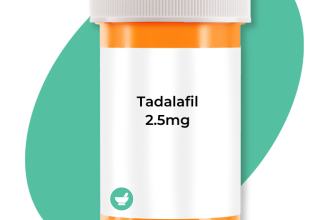Consult your healthcare provider about metformin if you’re managing type 2 diabetes. This medication helps control blood sugar levels and plays a significant role in diabetes management. Often prescribed as the first-line treatment, metformin improves insulin sensitivity and reduces glucose production in the liver.
Research indicates that metformin not only aids in blood sugar regulation but may also assist in maintaining a healthy weight. By promoting weight loss, it addresses one of the common challenges faced by individuals with type 2 diabetes. Regular monitoring and communication with your doctor can help optimize your treatment plan.
Potential side effects such as gastrointestinal discomfort require attention. Starting with a low dose and gradually increasing it can ease this transition. Staying hydrated and adhering to a balanced diet will enhance your overall experience with the medication, leading to better health outcomes.
Engaging in regular physical activity complements metformin therapy. Exercise boosts insulin sensitivity and helps maintain stable blood sugar levels, creating a powerful combination for diabetes management. Always consult with your healthcare provider for personalized advice tailored to your individual needs.
Understanding Metformin: A Prescription Drug for Diabetes Management
Metformin serves as a frontline medication for type 2 diabetes, primarily lowering blood sugar levels by improving insulin sensitivity. This action helps the body use glucose more effectively, reducing the amount of sugar released by the liver. As a result, individuals may experience better glycemic control and a decreased risk of diabetes-related complications.
Health professionals often recommend metformin as the initial treatment option for patients diagnosed with type 2 diabetes. Typically, it is prescribed alongside lifestyle modifications, including a balanced diet and regular physical activity. Adapting these habits can further enhance metformin’s effects, leading to more stable blood sugar levels.
Dosage typically starts at a low level to minimize gastrointestinal side effects such as nausea or diarrhea. Gradual increases in dosage allow for better tolerance. Daily doses can vary, but taking metformin with meals often reduces side effects and improves absorption.
Monitoring blood sugar levels regularly is crucial while using metformin. Patients should work with healthcare providers to adjust dosages based on their unique responses to the medication. Regular check-ups help ensure optimal management and address any concerns, such as potential vitamin B12 deficiency associated with long-term use.
While metformin is generally well-tolerated, some individuals may need to avoid it due to kidney issues or specific medical conditions. Always discuss your medical history with your healthcare provider to determine the best treatment approach for your diabetes management.
In summary, metformin plays a key role in managing type 2 diabetes. Its mechanism of action, dosage guidelines, and monitoring practices significantly contribute to effective blood sugar control, making it a preferred choice among healthcare professionals.
Mechanism of Action and Benefits of Metformin for Type 2 Diabetes Patients
Metformin primarily lowers blood glucose levels through several key mechanisms. It reduces hepatic glucose production, particularly in the liver, which is crucial for controlling high blood sugar levels. By decreasing the amount of glucose released into the bloodstream, metformin helps maintain more stable glucose levels throughout the day.
Additionally, metformin enhances insulin sensitivity in peripheral tissues, such as muscles and fat. This action helps cells utilize glucose more effectively, leading to improved glucose uptake from the bloodstream. Unlike some other diabetes medications, metformin does not stimulate insulin secretion from the pancreas, which reduces the risk of hypoglycemia.
Another significant benefit of metformin is its ability to reduce intestinal absorption of glucose. This contributes to lower post-meal blood sugar levels, making it easier for patients to manage their diabetes throughout the day.
Beyond glycemic control, metformin offers several additional advantages for patients with type 2 diabetes. Research indicates that metformin may support weight management, which is particularly beneficial since many individuals with type 2 diabetes struggle with excess weight. Studies show that metformin can lead to modest weight loss or prevent weight gain in some patients.
Metformin also demonstrates cardiovascular benefits. Evidence suggests it may lower the risk of cardiovascular events, such as heart attacks and strokes, in individuals with diabetes. This is crucial, as people with type 2 diabetes face a higher risk for cardiovascular disease.
In summary, metformin serves as a cornerstone in the management of type 2 diabetes by effectively lowering blood sugar levels, improving insulin sensitivity, reducing glucose absorption, assisting in weight management, and offering cardiovascular protection. Patients should discuss these benefits with their healthcare providers to determine how metformin fits into their overall treatment plan.
Potential Side Effects and Considerations When Using Metformin
Monitor your gastrointestinal health as metformin can lead to side effects such as nausea, diarrhea, and abdominal discomfort. Taking the medication with meals helps reduce these symptoms. If these side effects persist, discuss alternative medications with your healthcare provider.
Lactic Acidosis Risk
Be aware of the rare but serious risk of lactic acidosis, a condition characterized by the buildup of lactic acid in the bloodstream. This risk increases in individuals with compromised kidney function, liver disease, or heavy alcohol use. Regular kidney function tests are crucial for those taking metformin. Consult your doctor if you experience symptoms like muscle pain, trouble breathing, or unusual fatigue.
Vitamin B12 Deficiency
Regularly check your vitamin B12 levels, as metformin may cause decreased absorption over time, leading to deficiency. Symptoms of deficiency include fatigue, weakness, and nerve damage. A simple blood test can help determine your levels, and supplementation may be recommended if deficiency occurs.
Stay hydrated while on metformin, especially during periods of illness or dehydration, as this medication alters kidney function. If you plan to undergo imaging studies that require contrast dyes, inform your healthcare provider to avoid potential complications.
Communicate openly with your healthcare team about all medications and supplements you take. Certain herbs and supplements may interact with metformin, impacting its effectiveness.
Adjustments in lifestyle, including a balanced diet and regular exercise, enhance the benefits of metformin. Maintaining a healthy lifestyle contributes to overall well-being and better glucose management.










